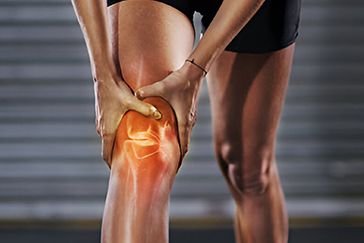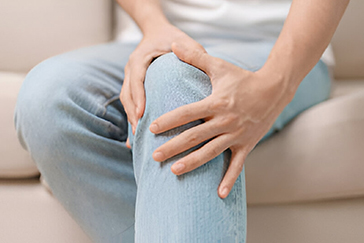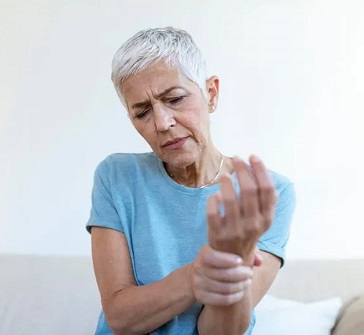 Book Appt.
Book Appt.
 Call Now
Call Now


Hip pain is pain or discomfort felt in or around the hip joint. A joint is a location in the body where two bones meet. Your hip joint is where your thigh bone (femur) meets your pelvis. Your hip joint is one of your body's major joints, and you utilize it frequently to move, support your weight, and keep your balance. Hip pain can range from a little inconvenience to a more serious problem that requires medical attention. Where you feel pain is determined by which component of your hip joint is affected. You might get hip pain:
Causes
Hip pain can be caused by a variety of disorders, including arthritis, hip injuries (fractures, labral tears, and dislocation), bursitis, or structural abnormalities. Dancers and gymnasts are more prone to hip injuries and pain. Any injury to the components of your hip joint can cause pain. Hip injuries are typically caused by:
Some of the most common injuries that cause hip pain are:
Treatment
The therapies you require for hip pain depend on what is causing it. A healthcare expert will recommend remedies based on the degree of the pain and its underlying cause.
RICE treatment for hip pain.
The RICE method can typically be used to treat hip pain at home.
Medications
Your healthcare professional may recommend drugs to alleviate your hip pain and other symptoms. Most patients can use over-the-counter NSAIDs (ibuprofen, aspirin, and naproxen) or acetaminophen (Tylenol®). Do not take these medications for more than ten days in a row without consulting your doctor.
Physical therapy
If you have arthritis or another structural problem that is causing you discomfort, your doctor may recommend physical therapy. A physical therapist will demonstrate stretches and exercises to strengthen the muscles surrounding your afflicted hip. This should help you gain stability and decrease pain.
Hip surgery
Most patients with hip pain will not require surgery. However, your doctor may recommend it if your pain is severe and other therapies have failed. You may require surgery to treat a hip fracture or structural condition. Hip arthroscopy is the most common surgical procedure used to address the majority of hip discomfort. Your surgeon will make a few small incisions (cuts) in your hip's skin before inserting a special tool known as an arthroscope into the joint. The arthroscope has a camera and a light that allow your surgeon to diagnose and repair damage inside your hip. You might require a hip replacement (hip arthroplasty). Your surgeon will replace your hip with an artificial implant (prosthesis). If your hip pain and other problems interfere with your ability to stand, walk, and move, your specialist may prescribe a hip replacement.
Prevention
Hip pain may not always be preventable, especially if it is caused by an unforeseeable accident or a problem with the natural structure of your hip joint. During sports and other physical activities:
Conclusion
Hip injuries can have a substantial impact on mobility and overall quality of life. While some hip injuries come from violent occurrences, many are caused by overuse or deterioration over time. Prompt diagnosis and adequate therapy are critical for successful recovery. Strengthening the hip muscles, utilizing good technique, and remaining active will help you avoid hip injuries and live a healthy, pain-free existence. If you are experiencing symptoms of a hip injury, you should see a doctor for an appropriate diagnosis and treatment plan.
SHALBY Sanar International Hospitals provides extensive medical procedures backed up with our state-of-the-art technology and a team of highly qualified & experienced clinical experts.



Life Transformed: Mr. Blojah Felix Journey to Pain-Free Living | SHALBY Sanar

Pain-Free Living After 6 Years: Knee Replacement Success Story | Dr. Rohit Lamba

Bilateral Total Knee Replacement by Dr. Vikram Shah | SHALBY Sanar International Hospitals

Remarkable Recovery Story: Hip Replacement for Non-union Fracture

Incredible Recovery Story: Bilateral Knee Replacement Transformation

Knee Replacement Surgery by Dr. Rohit Lamba: 60-Year-Old's Remarkable Recovery

Renewed Hope: Successful Hip Replacement Surgery Transforms Iraqi Patient's Life

Exploring a Case of Revision Knee Replacement: Insights from Dr. Rohit Lamba

Triumphant Journey: Ms. Fatima, 69, Triumphs Over Revision Knee Replacement Surgery

Leaving the crutches behind – Riyaz, 43, gains confidence after a successful Hip Replacement Surgery

Transformative Total Knee Replacement Surgery: A New Lease on Life for 48-Year-Old Ramesh

Miraculous Recovery: 17-Year-Old Kenyan Overcomes Osteosarcoma with Mega Prosthesis Surgery

Mr. Omar Faruk's Remarkable Knee Recovery: ACL Reconstruction Success Story

Mrs. Vijay Luxmi's Remarkable Knee Replacement Journey

Umidjon, 36, from Uzbekistan shares his gratitude for a successful total hip replacement surgery

Ms. Mohsin from Iraq shares her gratitude for a successful Computer Navigated Total Knee Replacement

A Total Hip Replacement surgery gives Ms. Barry from Ghana, the ability to walk again.

Dr. Rohit Lamba talks about a successful Hip Replacement Surgery carried out on an Iraqi patient
Our doctors pen down their research findings and experiences from time to time. Their words provide deep insight into the latest techniques, technologies and other advancements in healthcare. It provides expert answers to all kinds of health questions for real-life issues.
VIEW ALL.png)
.png)



Since the day of its foundation, SHALBY Sanar International Hospitals is committed to provide comprehensive healthcare services. It regularly organizes awareness programs in its premises and encourages outdoor healthcare activities and camps with an intent to put focus on preventive healthcare.
VIEW ALL